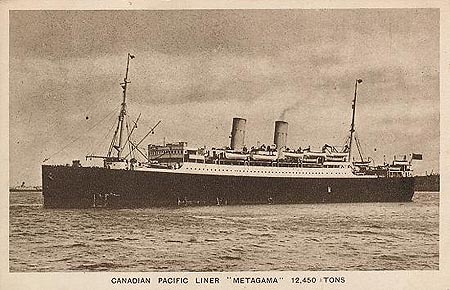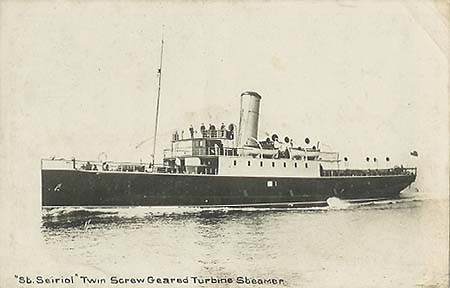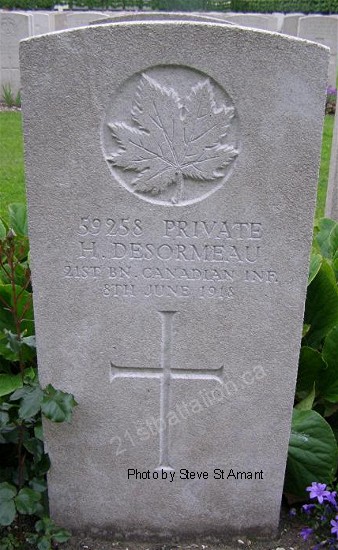|
Dec 13, 1892
|
Born in Mattawa, Ontario to Frank and Maggie
Desermeau
|
|
Feb 11, 1915
|
Attested into the 21st Battalion in
Kingston, Ontario
Ø Number 59258 (temporary number 1237)
Ø Next of kin given as Maggie Neville, mother, Mattawa, Ontario
Ø Previous occupation given as Labourer
Ø No previous military experience given
Ø Religion given as Roman Catholic
Ø Assigned to the battalion’s Base Unit
o He was later transferred to “D” Company
The battalion trained in the Kingston area
through the winter with headquarters in the Kingston Armouries
Harry had 2 brothers who also joined the 21st
Battalion, Albert, 59256, and Frank, 59257
|
|
May 6, 1915
|
Embarked the RMS Metagama in Montreal, Quebec

|
|
May 15, 1915
|
Disembarked in Devonport, England and the
battalion proceeded to the West Sandling Camp, near Hythe, Kent to continue training
|
|
Jul 24, 1915
|
Sentenced to 10 days detention and restricted to
half pay for 1 month for being AWL (Absent Without Leave) from July 19 to July 23, 1915
|
|
Aug 3, 1915
|
Sentenced to 2 days detention for breaking out
of the Guard Room
|
|
Sep 3, 1915
|
Sentenced to 28 days detention and forfeiture of
2 days pay for being absent from August 31 to September 1, 1915
|
|
Sep 14, 1915
|
Embarked the St. Seiriol in Folkestone

It would appear that he was released early from
detention in order to proceed to France with the battalion
|
|
Sep 15, 1915
|
Disembarked in Boulogne, France and the
battalion proceeded to St. Omer
|
|
Apr 30, 1916
|
Sentenced to 14 days Field Punishment #1 for
being absent from duty for less than 6 hours and insolence to an NCO on April 13, 1916
|
|
Jul 4, 1916
|
Sentenced to 28 days Field Punishment #1 for
being absent from July 1 to July 3, 1916 and forfeited 3 days pay
|
|
Jul 15, 1916
|
Sentenced to an additional 10 days Field
Punishment #1 for being absent from 2 pm July 14 to 9 am July 15, and forfeited 2 days pay
|
|
Feb 12, 1917
|
Admitted to the 139th Field Ambulance
with a diagnosis that reads Carries Dentine (tooth cavities). He was transferred the same day to the 41st
Division Rest Station for treatment
|
|
Feb 14, 1917
|
Discharged to his unit from the rest
station
Attached to the 250th Tunnelling
Company Canadian Engineers for duty
|
|
Jun 5, 1917
|
Admitted to the 59th Field Ambulance
with a diagnosis that reads VDG (Venereal Disease Gonorrhea)
|
|
Jun 7, 1917
|
Transferred to the No. 51 General Hospital in
Etaples
|
|
Aug 1, 1917
|
Discharged from
hospital and joined the No. 2 CIBD (Canadian Infantry Base Depot) in Etaples
His pay was deducted
at the rate of 50¢ per day and loss
of Field Allowance for the 55 days he was in hospital as punishment for the Gonorrhea
infection
|
|
Aug 23, 1917
|
Left the CIBD to join the entrenching battalion
|
|
Aug 25, 1917
|
Joined the 2nd Entrenching Battalion
in Hersin
|
|
Sep 1, 1917
|
Left the entrenching battalion and rejoined the
250th Tunnelling Company
|
|
Sep 2, 1917
|
Left the tunnelling company and joined the 21st
Battalion in billets in Villers au Bois, France
|
|
Sep 30, 1917
|
Admitted to the No. 6 CFA (Canadian Field
Ambulance) with a diagnosis that reads VDG, and transferred the same day to the No. 10 CFA
for treatment
|
|
Oct 12, 1917
|
Discharged from the field ambulance and rejoined
the 21st Battalion in the Suburban Camp in Villers au Bois
|
|
Nov 9, 1917
|
While on the Passchendaele front, Private
Desermeau received severe shrapnel wounds to his arms, legs and buttocks. He was admitted to the No. 1 CFA for first aid
then transferred to the No. 3 CCS (Casualty Clearing Station) where surgery was performed
to remove shrapnel from his right arm, buttocks and thighs
|
|
Nov 10, 1917
|
Transferred via the No. 16 AT (Ambulance Train)
and admitted to the No. 9 Lakeside USA General Hospital in Rouen
|
|
Nov 18, 1917
|
His wounds became septic and he was placed on
the dangerously ill list
|
|
Dec 16, 1917
|
His left leg was amputated below the hip
|
|
Jun 8, 1918
|
Private Harry Desermeau died of his wounds while
still in the No. 9 Stationary Hospital and was buried in the nearby St. Sever Cemetery
Extension, Rouen, France.

Following the war the 1914-15 Star, British War
Medal, Victory Medal, Plaque (Dead Man’s Penny) and Scroll were sent to his father,
Frank Desermeau, Timmins, Ontario
The Memorial Cross was sent to his mother, Mrs. M.
Desermeau, at the same address
|
|